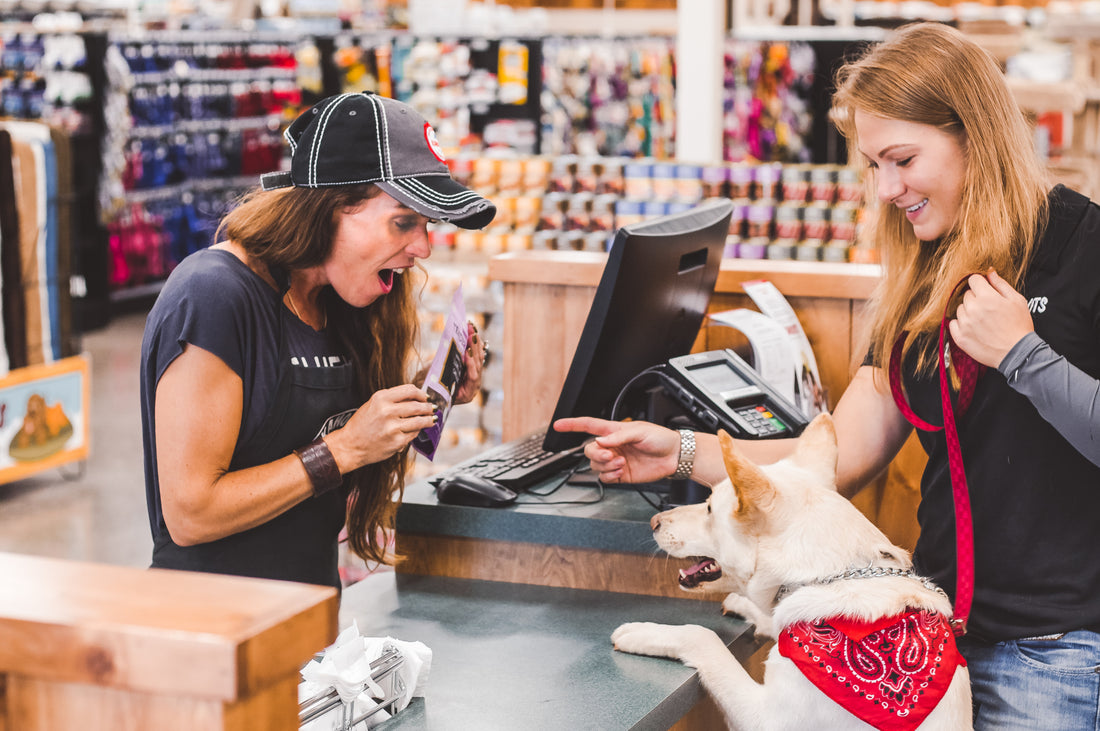Who doesn’t love spoiling their dog with a few treats here and there? However, if your dog suffers from symptoms of occasional digestive upset like smelly gas, grass eating or nausea, loose stool, or constipation, treats may be an unexpected trigger. In this comprehensive guide, we'll dive into the world of treats for the 'sensitive stomach' dog, discussing the causes of digestive issues in dogs, ingredients to look for and avoid, and our top recommendations for the best dog treats on the market for sensitive stomachs.
Common Causes of Sensitive Stomachs in Dogs
A sensitive stomach in dogs can be caused by various factors, including food intolerances (or less commonly, allergies), dietary changes, underlying health conditions, and stress. Some of the most common causes of digestive issues in dogs include:
Treat Intolerance: Intolerance to specific ingredients like corn, wheat, beef, and chicken can cause digestive upset because your dog’s digestive system may not be able to properly break down and process these ingredients. This can lead to inflammation, irritation, and other digestive issues that result in messy and uncomfortable symptoms. It is important to identify and eliminate the specific ingredient causing the reaction in order to alleviate these symptoms and improve your dog's overall health.
Rapid changes in diet or introduction of new foods: Changing things like the type of meat protein, the protein percentage, or even suddenly changing up the brand of food you’re feeding could also cause stomach issues. It's important to make any dietary changes gradually to avoid upsetting your dog's stomach.
Stress or anxiety affecting digestion: Stress and anxiety can have a significant impact on your dog's digestive system and may be a possible cause of their sensitive stomach. If you suspect that your dog is experiencing stress or anxiety, it's important to identify the root cause and take steps to alleviate it. This may involve making changes to their environment, providing more exercise and mental stimulation, or even seeking the advice of a veterinarian or animal behaviorist
Age-related changes in digestive function: As dogs age, their bodies undergo changes that can impact their digestive system and lead to more sensitivity or frequent upset. Common changes are a decrease in digestive enzyme availability, stomach acid production, and intestinal motility. These changes can make it more difficult for dogs to digest their food properly, leading to symptoms such as gas, bloating, and diarrhea.
Can Your Dog’s Diet Help Ease Sensitive Stomach Symptoms?
Absolutely! Diet plays a crucial role in alleviating the symptoms of a dog's sensitive stomach. Furthermore, a healthy diet is holistic and includes everything your dog eats—food, snacks, and chews.
Feeding your dog a simple, high-quality diet with limited ingredients can help soothe their digestive system. Feeding a limited ingredient chicken and rice formula is often one of the first recommendations as it tends to be easy on sensitive stomachs. Additionally, introducing supplements such as probiotics, pumpkin or sweet potato puree, bone broth, and goat's milk can support gut health and help your dog's system get back in balance. It's important to stick to this diet for at least a few weeks to give your dog the best chance to reset and prevent future digestive upset.
Of course, because diet involves everything that your dog eats, this is all true for treats too. Sticking to limited ingredient, easily digestible treats will make it easier on your dog’s digestive system. So if you find yourself needing to change your dog’s diet to ease digestive issues, be sure to adjust their treats to match.
Ingredients to Look for and Ingredients to Avoid in Dog Treats for Sensitive Stomachs
When searching for dog treats for sensitive stomachs, it's crucial to pay attention to the ingredients. The simpler, the better! Especially if the ingredients directly support gut health. Here are some ingredients to look for and avoid when selecting dog treats:
Ingredients to Look For:
- Single-source, high-quality animal protein (e.g., turkey, lamb, or salmon)
- Easily digestible carbohydrates (e.g., sweet potatoes, pumpkin, and rice)
- Healthy animal-based fats (e.g., chicken fat or salmon oil)
- Dietary fiber for digestive support (e.g., pumpkin, sweet potato, beet pulp)
- No artificial colors, flavors, or preservatives (these ingredients have been known to trigger food intolerances in dogs)
- Probiotics and prebiotics for healthy gut flora and regular digestion
Types of Dog Treats for Sensitive Stomachs
Navigating the plethora of dog treats available on the market can be overwhelming. Choosing the right treats is crucial to avoid exacerbating digestive problems and to ensure your dog's overall health and happiness.
Limited-ingredient Treats: Limited-ingredient treats are made with a minimal number of ingredients, reducing the chance of digestive upset. These treats typically feature a single protein source with or without easily digestible carbohydrates, making them ideal for dogs with food sensitivities or allergies.
Probiotic Treats: Probiotic treats contain live beneficial bacteria that help support a healthy balance of gut flora, promoting regular digestion and overall gastrointestinal health. They can be especially beneficial for dogs experiencing digestive issues due to stress or dietary changes.
Dental Treats: Dental treats are designed to help clean your dog's teeth and promote good oral hygiene, but not all are gentle on their stomachs. Look for dental treats made with natural, easily digestible ingredients and avoid those with artificial additives or high-fat content.
Soft and Chewy Treats: Soft and chewy treats are easier for dogs with sensitive stomachs to digest, as they require less effort to break down. Choose treats made with wholesome, natural ingredients and avoid those with fillers or artificial additives.
Freeze-dried and Dehydrated Treats: Freeze-dried and dehydrated treats are made by removing moisture from high-quality ingredients, preserving their nutritional value without the need for artificial preservatives. These treats are typically grain-free and made with a single protein source, making them a suitable option for dogs with sensitive stomachs.
Dog Treat Examples for Sensitive Stomachs
Now that we've covered the essentials about sensitive stomachs in dogs and which types of treats to look out for, let's move on to the fun part—product recommendations!
Kahoots Sweet Potato Chews: A superb treat for dogs with sensitive stomachs. They’re made from a single ingredient—sweet potato—that is loaded with fiber, vitamins, and minerals. These non-GMO, minimally processed chews are slow-dried and oven-baked to retain their nutritional benefits and enhance digestibility, and they are always antibiotic and hormone-free, assuring a natural and wholesome treat for your pet.
ORIJEN Freeze-Dried Dog Treats: Crafted with 99% quality animal ingredients including free-run poultry and wild-caught flounder, provide a rich source of protein that is ideal for dogs with sensitive stomachs. The treats are freeze-dried to retain nutrients and flavor without artificial preservatives, and at just five calories per piece, they're a guilt-free reward suitable for training or simply treating your pup.
Kahoots Cod Skin Minis and Sticks: An ideal choice for dogs with sensitive stomachs, being single-ingredient treats made from 100% cod skin, which is naturally high in Omega-3s and rich in essential nutrients. They are grain and gluten-free, air-dried to maintain their natural benefits, and their non-GMO composition makes them a wholesome, natural, and convenient choice for a tasty treat or training reward.
Natural Balance Limited Ingredient Diets Original Biscuits: Crunchy biscuits designed with the needs of sensitive stomachs in mind, with single animal protein sources and grain-free fiber sources from potatoes and sweet potatoes for healthy digestion. The thoughtful crafting of these treats includes limited ingredients and no artificial additives, reducing the likelihood of triggering food sensitivities, and their small size and crunchy texture make them perfect for small breeds while supporting oral health.
Wrapping Up
Remember, picking out treats for our four-legged friends with sensitive tummies might take a bit of time and some detective work, but hey, our pups are worth it, right? By paying attention to what's in those treats and how they're made, you're well on your way to giving your furry pal something yummy that won't upset their tummy. It's a win-win! Happy treating!

